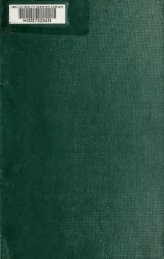The Health bulletin [serial] - University of North Carolina at Chapel Hill
The Health bulletin [serial] - University of North Carolina at Chapel Hill
The Health bulletin [serial] - University of North Carolina at Chapel Hill
You also want an ePaper? Increase the reach of your titles
YUMPU automatically turns print PDFs into web optimized ePapers that Google loves.
—<br />
—<br />
8 'J'llK IIeALTII JJlLLKTlN January, 192"!<br />
York St:ito<br />
as compared with tho more<br />
temper<strong>at</strong>e elim<strong>at</strong>e <strong>of</strong> California are not<br />
major factors in the susci'i)til)ilit.v to<br />
111 1»spir<strong>at</strong>ory traet infections. It<br />
may he a (lisapiinintment to those uiven<br />
to otfhand pronouncements to read tli<strong>at</strong><br />
whetlier the students use sleeping<br />
porches, well ventil<strong>at</strong>ed hedrooms or<br />
l)Oorly ventil<strong>at</strong>ed bedrooms for sleeping<br />
purposes does not m<strong>at</strong>erially affect the<br />
susceptihility grou])ing. Although the<br />
morbidity is slightly higher among those<br />
using poorly ventil<strong>at</strong>ed rooms, the difference<br />
is not gre<strong>at</strong> enough to warrant<br />
any definite conclusions. Only by facing<br />
the st<strong>at</strong>istical facts squarely without<br />
commitment to any unproved hypothesis<br />
can it be hoped to make real progress<br />
in the mastery over the common cold.<br />
Meanwhile the methods for prevention<br />
and measures for protection may well<br />
be based on common sense hygiene<br />
r<strong>at</strong>her than specious theories."<br />
— Journal A. M. A.<br />
"<strong>The</strong> Season <strong>of</strong> Colds"<br />
"<strong>The</strong> approach <strong>of</strong> cooler we<strong>at</strong>her will<br />
soon bring with It the usual crop <strong>of</strong><br />
colds. While much <strong>at</strong>tention is being<br />
given to «ancer and heart disease and<br />
similar important health problems no<br />
one seems much concerned over the subject<br />
<strong>of</strong> common colds.<br />
"Endowments are being asked for<br />
many types <strong>of</strong> health work, none <strong>of</strong><br />
which surpass the common cold in producing<br />
disability or in leading to other<br />
and more serious consequences. <strong>The</strong>re<br />
is probably no disease <strong>of</strong> as far reaching<br />
importance—unless it is syphilis<br />
as the common cold. Its economic<br />
significance among wage earners cannot<br />
be computed, but it is known as the<br />
cause <strong>of</strong> the gre<strong>at</strong>est loss <strong>of</strong> time and<br />
efficiency with which industry has to<br />
deal although individual losses are not<br />
large.<br />
"Why are not more serious efforts<br />
made to determine the cause and eradic<strong>at</strong>e<br />
it Organized research backed by<br />
ample funds would doubtless uncover<br />
many important facts now buried in<br />
ignorance or lack <strong>of</strong> interest in the subject.<br />
"Does the lack <strong>of</strong> possible spectacular<br />
results detract from this field A solution<br />
<strong>of</strong> the caus<strong>at</strong>ion <strong>of</strong> the common<br />
cold will entitle its discoverer to fame<br />
as lasting as th<strong>at</strong> <strong>of</strong> Koch. Pasteur.<br />
Keed, or other c(mquerers <strong>of</strong> man's disease<br />
enemies. <strong>The</strong> solution may lie in<br />
the fields <strong>of</strong> Itacteriology, or physiology,<br />
or <strong>of</strong> chemistry, or in all three, but<br />
wherever it is, the service to mankind<br />
will more than comi)ens<strong>at</strong>e for efforts<br />
put forth in its <strong>at</strong>tainment. Let us<br />
cease considering the cold as a minor<br />
affliction and <strong>at</strong>tack it vigorously and<br />
effectively. Tlie result will be worth<br />
far more than any cost or time involved."<br />
<strong>The</strong> N<strong>at</strong>ion's <strong>Health</strong>.<br />
"How We C<strong>at</strong>ch<br />
Common Colds"<br />
"Almost every one has a belief as to<br />
the cause <strong>of</strong> c<strong>at</strong>ching a cold and has a<br />
method <strong>of</strong> tre<strong>at</strong>ment th<strong>at</strong> he thinks will<br />
cure it. Among the more common<br />
secondary factors usually mentioned are<br />
sitting in a draft, changing from winter<br />
to summer underwear, going from a<br />
hot room to a cold one, and getting the<br />
feet wet. <strong>The</strong> cures include the use <strong>of</strong><br />
a warm foot b<strong>at</strong>h, a hot b<strong>at</strong>h, a cold<br />
b<strong>at</strong>h, lots <strong>of</strong> fresh air, no fresh air,<br />
e<strong>at</strong>ing <strong>of</strong> onions, carrots or celery, and<br />
a half dozen other methods based on<br />
some grandmother's advice or a superstition.<br />
"Most physicians believe th<strong>at</strong> colds<br />
are transmitted from one person to another<br />
by the intermedi<strong>at</strong>ion <strong>of</strong> a germ<br />
as yet unidentified, and th<strong>at</strong> one is<br />
likely to c<strong>at</strong>ch cold particularly if he<br />
has been in a draft or has otherwise<br />
been exposed to some change <strong>of</strong> external<br />
temper<strong>at</strong>ure.<br />
"Dr. D. F. Smiley <strong>of</strong> Cornell <strong>University</strong>,<br />
after an investig<strong>at</strong>ion <strong>of</strong> common<br />
colds among the students <strong>of</strong> th<strong>at</strong><br />
school, concluded th<strong>at</strong> it is impossible<br />
to prove th<strong>at</strong> overexercise, cold b<strong>at</strong>hs,<br />
loss <strong>of</strong> sleep, drafts, kind <strong>of</strong> underwear<br />
worn, mouth bre<strong>at</strong>hing, the kind <strong>of</strong><br />
shoes worn in wet we<strong>at</strong>her, swe<strong>at</strong>ing<br />
after exercising, or the removal <strong>of</strong><br />
tonsils or adenoids are factors in c<strong>at</strong>ching<br />
cold.<br />
"More recently Dr. William H. Barrow<br />
<strong>of</strong> Stanford <strong>University</strong> concluded<br />
after a study <strong>of</strong> colds in th<strong>at</strong> institution<br />
th<strong>at</strong> the various systems <strong>of</strong> he<strong>at</strong>ing<br />
such as coal stoves, steam he<strong>at</strong>, gasoline,<br />
oil stoves or no he<strong>at</strong> <strong>at</strong> all did not<br />
seem to influence in any way the num-


![The Health bulletin [serial] - University of North Carolina at Chapel Hill](https://img.yumpu.com/33495252/14/500x640/the-health-bulletin-serial-university-of-north-carolina-at-chapel-hill.jpg)
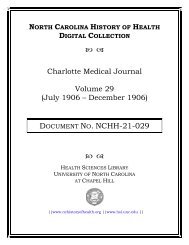
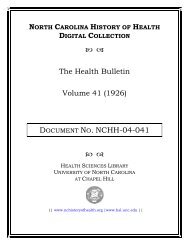
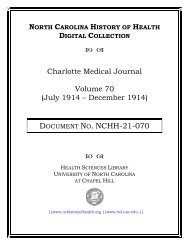
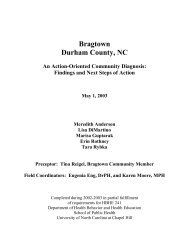
![Bulletin of the North Carolina Board of Health [serial] - University of ...](https://img.yumpu.com/48032016/1/153x260/bulletin-of-the-north-carolina-board-of-health-serial-university-of-.jpg?quality=85)
![The Health bulletin [serial] - University of North Carolina at Chapel Hill](https://img.yumpu.com/47603625/1/169x260/the-health-bulletin-serial-university-of-north-carolina-at-chapel-hill.jpg?quality=85)
![The Health bulletin [serial] - University of North Carolina at Chapel Hill](https://img.yumpu.com/47242858/1/169x260/the-health-bulletin-serial-university-of-north-carolina-at-chapel-hill.jpg?quality=85)
![The Health bulletin [serial] - University of North Carolina at Chapel Hill](https://img.yumpu.com/43204263/1/172x260/the-health-bulletin-serial-university-of-north-carolina-at-chapel-hill.jpg?quality=85)
![The Health bulletin [serial] - University of North Carolina at Chapel Hill](https://img.yumpu.com/41981074/1/163x260/the-health-bulletin-serial-university-of-north-carolina-at-chapel-hill.jpg?quality=85)
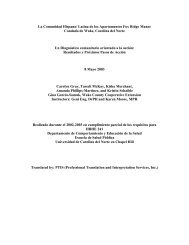
![The Health bulletin [serial] - University of North Carolina at Chapel Hill](https://img.yumpu.com/40912928/1/164x260/the-health-bulletin-serial-university-of-north-carolina-at-chapel-hill.jpg?quality=85)
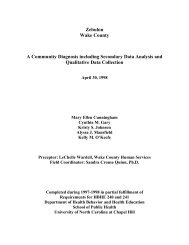
![The Health bulletin [serial] - University of North Carolina at Chapel Hill](https://img.yumpu.com/35643061/1/167x260/the-health-bulletin-serial-university-of-north-carolina-at-chapel-hill.jpg?quality=85)
![Biennial report of the North Carolina State Board of Health [serial]](https://img.yumpu.com/34024350/1/166x260/biennial-report-of-the-north-carolina-state-board-of-health-serial.jpg?quality=85)
